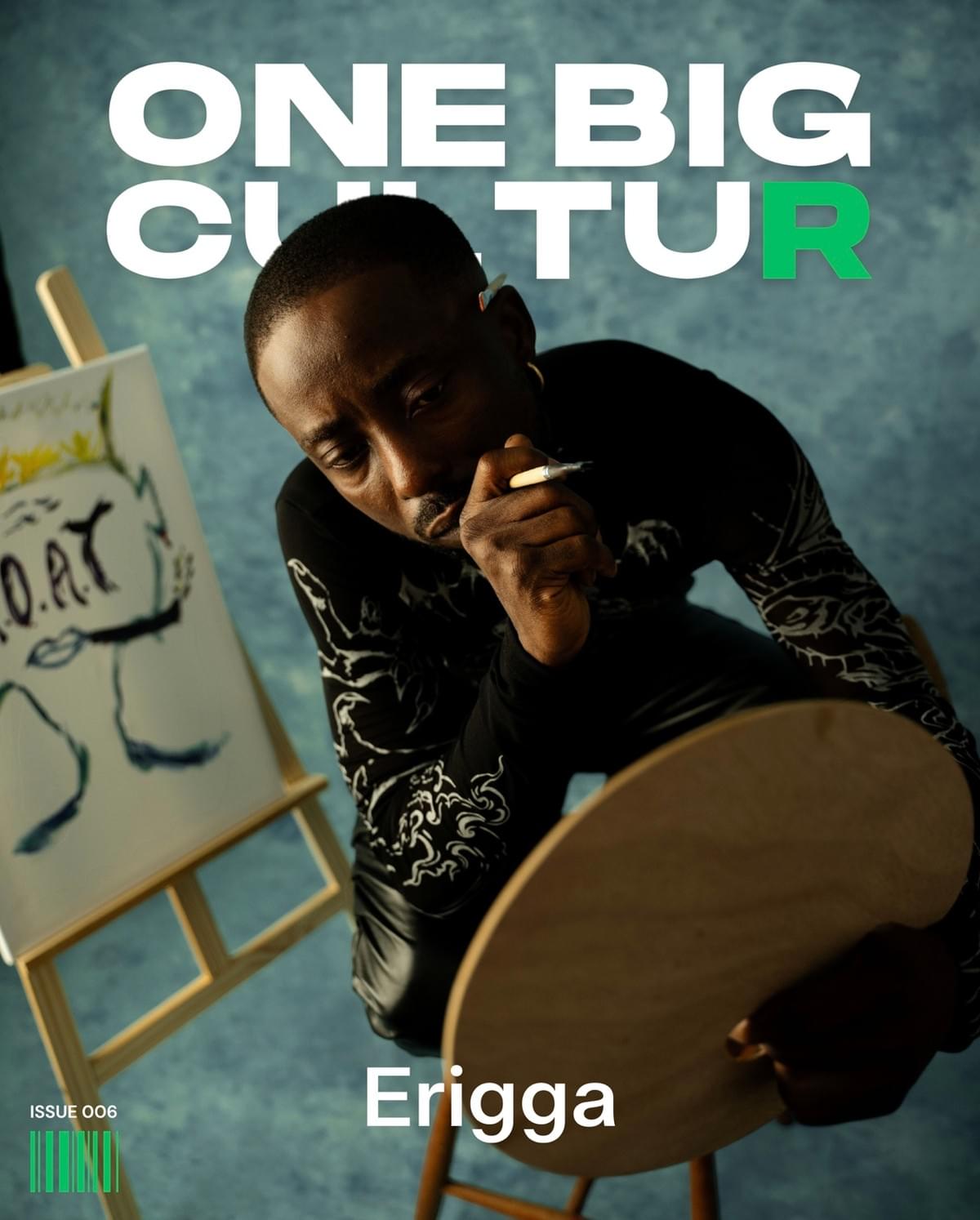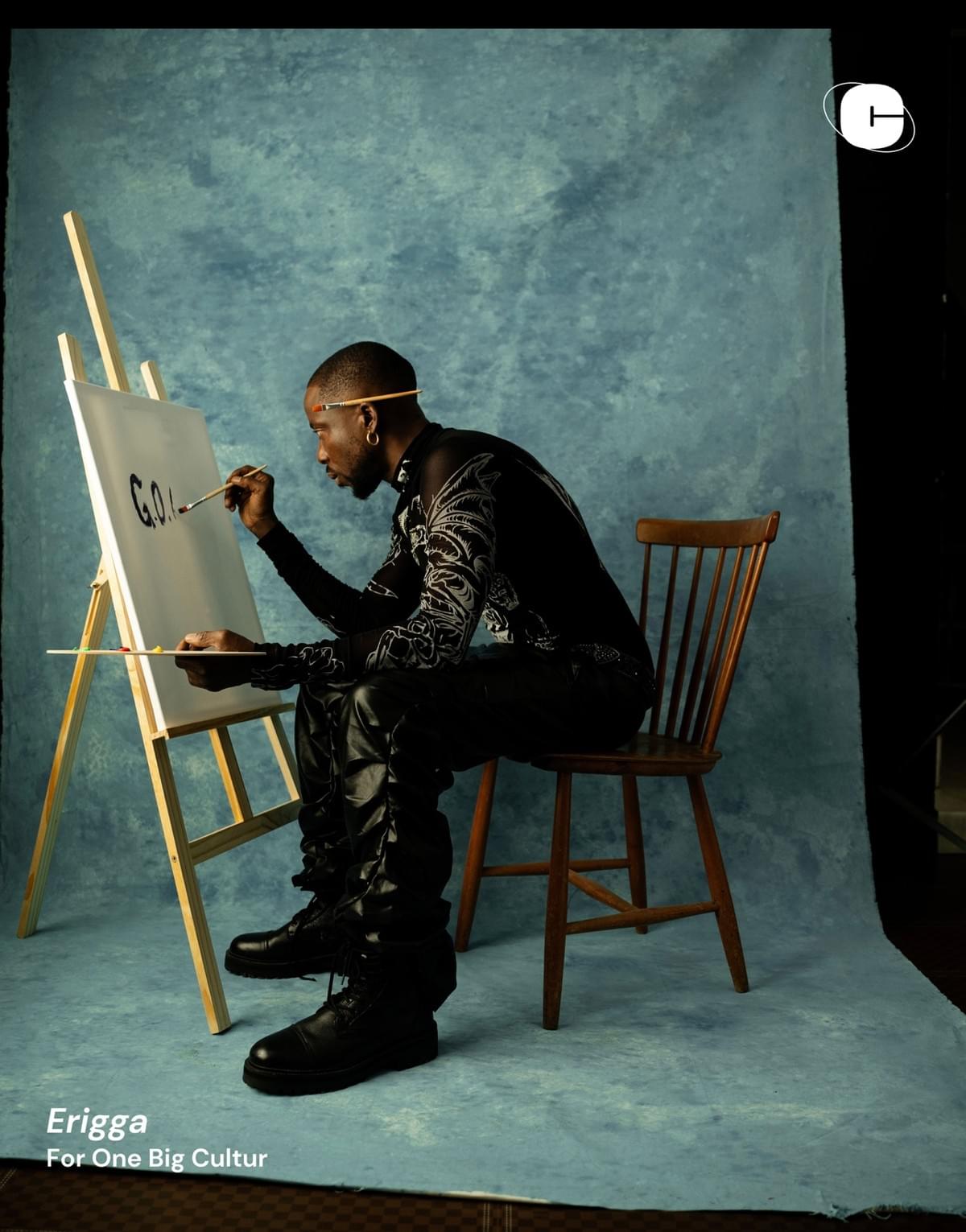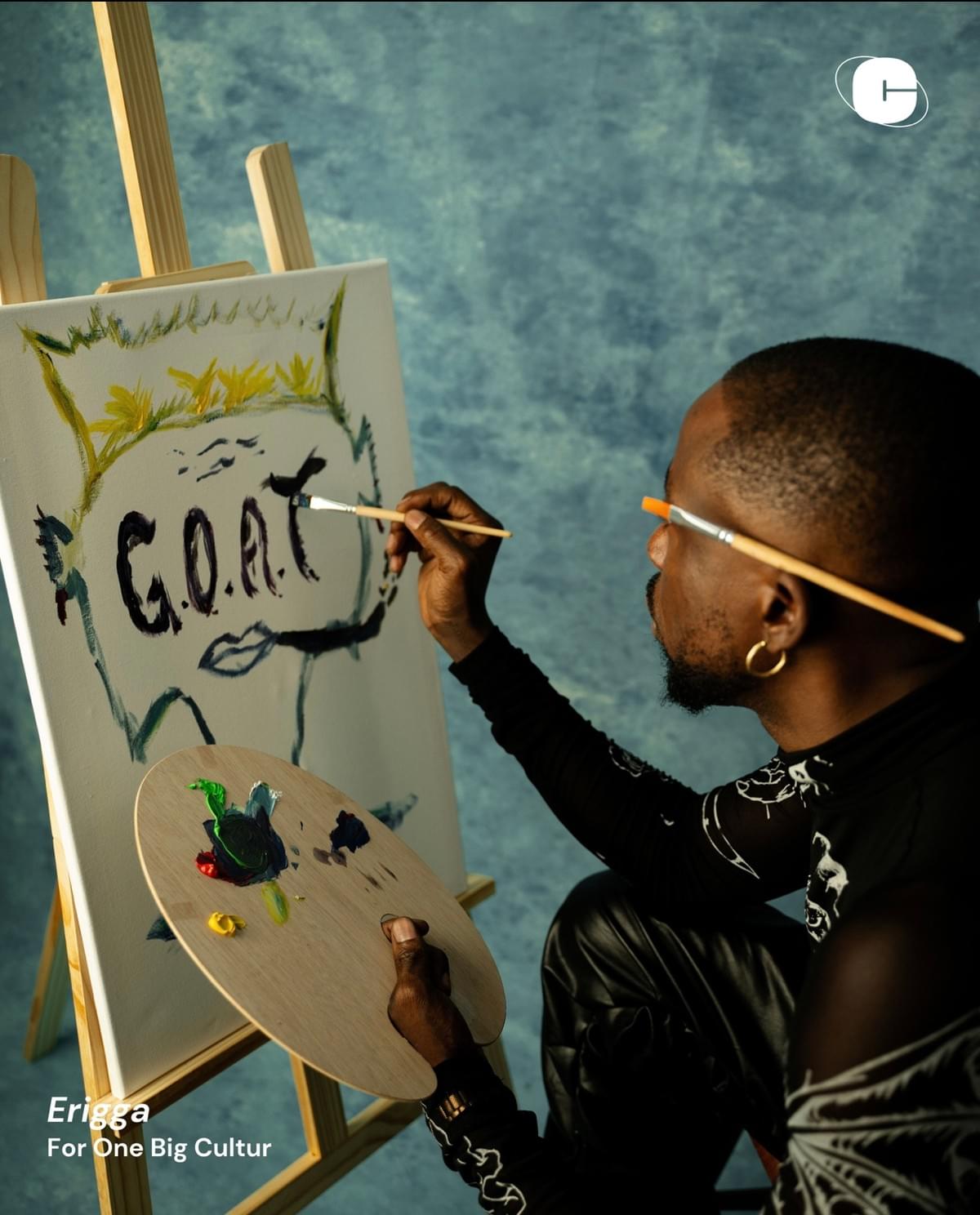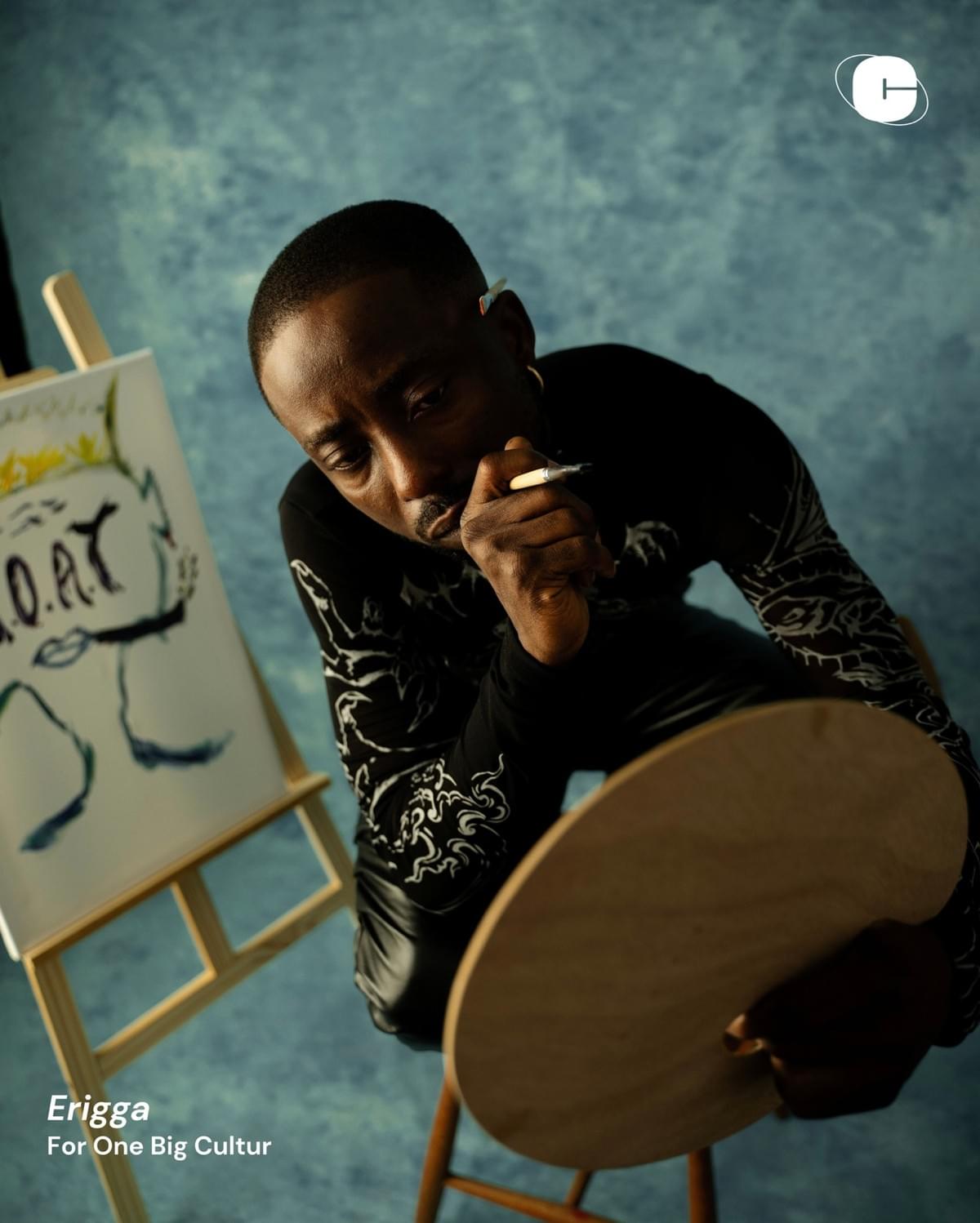
Welcome to One Big Culture, where we dive into the untold stories of the most fascinating creatives. Today, In the vibrant world of Nigerian music, few names resonate as deeply as Erigga. With a career spanning over a decade, Erigga has established himself as a force to be reckoned with in the rap scene. From the gritty streets of Warri to the global stage, his journey is a testament to the power of authenticity and creativity. In this exclusive interview, Erigga opens up about his life, music, and the unapologetic voice that has captured the hearts of fans worldwide.
Elle: You’ve called yourself “The Erigma” a play on ‘Erigga’ and ‘Enigma.’ What makes you feel like a puzzle to people?
ERIGGA: Yeah. You know that Erigma, I formed that Erigma from the challenge that Don Jazzy did. That was in 2010 or 11. He dropped a beat and called it Enigma. I'm like, okay, Enigma. Yeah, I know what it means, but I think you're talking to me because I feel like I embody everything that you're looking for. And He had, like, $2,000 for the winner, you know? And I'm like, okay, let me just jump on this. And I did what nobody has done in the industry before. The rawest of the rawest of rap. And that just gave me this opening in the industry. People were like there's this guy that is raw, etc. So it's kind of like a gift and a curse, though, because a couple of radio stations are like, oh, you're playing ERIGGA. You have to be careful because you don't know when he will spill it out And the street is like, come on, we need this because the radio is not going to give us the truth. This is where we'll find the truth.
Elle: You seem guarded, even in your lyrics. Where does that come from—is it protection, personality, or survival?
ERIGGA: Oh, mine is kind of different because my music is very tied to my upbringing. It's tied to my community. It's tied to me growing up. Street Activities. There are certain things that a rapper will come up and just spit and get away with it. I'm not going to get away with that because there are some certain things that you shouldn't, and that's why you can't really touch ERIGGA . ERIGGA is just like the prophet in the prophet, like he says things and they come into existence. He's been there. He's like the elder brother that these cats, these young kids look up to, the father they never had, The elder brother they never had. They never have the mentor, a teacher. I have students there. I'll call them my students because I can literally have an argument with them and say, yo, what album had these lyrics that I said this and though sometimes I don't even have to. They'll just bring it like, yo bro, you said this. I'm like, okay, cool. Meaning you guys are paying attention. So I am like Jesus Christ to them. But It's different
Elle: If someone only ever hears the gritty side of your music, what part of you would they completely miss?
ERIGGA : If someone only hears the gritty side of my music, they'd miss the vulnerable and hopeful side of me. My music isn't just about the struggles, it's also about resilience, love, and the beauty of life. They might not hear the humor, the storytelling.
Elle : GOAT feels like a heavy album sacrifice, therapy, prayer. What space were you in when creating this project?
ERIGGA: At the beginning of the song ”Sacrifice” I said if you know pain, you know the sacrifice. Growing up in the trenches, we already know that we have to make certain sacrifices for where we want to get to, some sacrifice their dignity, some sacrifice their life, like the Abraham story after waiting for his child for a long time, it has to hurt you for it to be considered a sacrifice. It was kind of like a two way stuff, one part was for me, the other was for the fans. I was supposed to drop the album last year march 30th but I couldn’t, maybe the iniverse didn’t want me to release it yet, then two months later, I lost my dad. So that kind of changed the trajectory of the album. For the fans that waited, I had to drop it, because they waited for like a whole year.
Elle: “Trenches to Blessings” could’ve been the name of the album. Was there ever a time where you felt like choosing school or structure would have stopped your hustle?
ERIGGA: "Trenches to Blessings" is a powerful title. Looking back, I'd say there were definitely times when I felt like choosing school or structure might have provided stability, but I'm not sure it would've allowed me to tap into the raw energy and creativity that comes from being in the trenches.
Elle: “Therapy Session” with Bella Shmurda is such a layered track. What inspired that concept and what does Okriportor mean?
ERIGGA: It means an itching infection, so there was a pandemic when I was younger, everybody in Warri was walking on the road and was itching, it made it to the news, that there was a case of infection in Warri and it was eventually called sweetie, so it just means “ Use your ego scratch your balls”
Elle: One of my favourite tracks is “John Bull” with JAQI. Her vocals felt soft but strong how did that collaboration come about?
ERIGGA: The album is called the GOAT, what were you expecting? People were thinking I was going to pack some big names and put in my album, no my work isn’t like that. My manager sent me her video, because they used to work together and I was like wow this is fire, so I laid out my verse, my manager called me and said “shey you no go change this verse”? I said don’t worry let her settle me, later he called me back and said “ah no change am, I dey get where you de go”. I was just trying to get people to see this John Bull guy from another perspective, there are a lot of johnbulls on the street, bad boy enjoying the life and not caring about anything.
Elle: You also linked up with Ajebo Hustlers on “Abeg.” What made you tap those guys for this record and what do they represent to you in the South-South soundscape?
ERIGGA: I have known Knowledge(Ajebo Hustlers) for more than 12 years now, when i used to do shows in Uni Port, we wanted to do something different. We did not want to represent just bars bars bars, we wanted something like who is driving the flyest ride, and other stuffs. Aside that they are good, they are making their wave in the rapping sector, and I like that, guys too with that kind of energy, Odumodublvck, PsychoYP. These are the guys.
Elle: “Upper Iweka” with Phyno feels like two local giants linking. Was that a brotherhood moment or a business decision?
ERIGGA: I wanted to mess with their mind a bit, I wanted people to know about the song but I don’t want to do a false trend, so I told my graphics guy to design something about it, when he sent it back, he did uppy iweka, I was like I am not going to pay this guy his balance, when I posted it everybody was editing it on the internet, Upper Iweka, Uppy Iweka, I was just psychologically possessing them. When the song finally dropped everybody was mind blown
Elle: Seven albums deep is there a song or message that people still don’t fully hear the way you intended?
ERIGGA: I feel like they don’t hear that I am not going to stop anytime soon. The train is not stopping anytime soon, because people keep wondering how long are you going to keep this up, since 2010, you still keep finding new lines. And I am like you people haven’t been listening, listen now and give me my accolades.

Elle: On “Gucci Belt” you say, “Add Yoruba you no wan blow?”let’s talk about that. Do you think there’s a Yoruba stronghold on the mainstream rap narrative in Nigeria?
ERIGGA: The funny thing is I wasn't even getting it from Yoruba people. My Yoruba friends or my Yoruba colleagues. I was getting it from my own people because they felt like this is This is what is coming to the city. This is what everybody is playing. This is new. Like they like new things like, this is foreign. So if you're not making it like these people, how do you expect to grow like them? And I'm telling you now that, yo, this is the future. You should buy this dip. Buy the Dip. Now they have to buy from the peak and complain that your people are your price.
Elle: What would a truer picture of Nigerian rap history look like from your perspective?
ERIGGA: Nigerian rap took a turn when a lot of the OGs just felt like. There's ageism. I think it's because they feel there's ageism. But as you grow, I believe that your message is going to change. So why are you not still giving us the same messages? Like who told you you can't do it? Who told you? You have to be 28 again, or 24 or 21 to do it again, like you're the best at what you do. So the people, the fans that you carry to this stage, who are you leaving them for?
They rocked their youth with you, now they are adults and you are telling them to go listen to one 21 or 22 year old kid, what can they actually get from there? When I was coming up, I was all about the younger generation because I was a part of that generation, the generation grew and told the next generation listen to this guy, this guy was hot. So when I ask you, who introduced you to Me, you will say my elder brother, my father. And so it's both generation, the old generation, the young generation, everybody, millennials, Gen Zs, even some of the generation X, even some boomers. So we're not going anywhere. And you can only get this through authenticity. Like when you're authentic, you can't change it, it’s who you are. You can't run from who you are.

Elle: You’ve been touring in Europe recently. What’s it been like connecting with fans who didn’t grow up with Warri slang, but still feel you?
ERIGGA: As Erriga, I'd say connecting with fans in Europe has been surreal. Despite the language barrier and cultural differences, the energy and passion for Warri slang transcend borders. Fans have been receptive, and I've been humbled by their enthusiasm. It's amazing to see how music can bridge gaps and create a sense of community.
The experience has also inspired me to explore new sounds and collaborations, blending Warri slang with European flavors.
Overall, it's been an incredible journey, and I'm grateful for the opportunity to share my art with a broader audience
Elle: Your sound is rooted in your world, yet it travels. What do you think breaks through language, energy, or emotion?
ERIGGA: I think it's a combination of all three language, energy, and emotion. Music has a way of transcending borders and languages, speaking directly to our emotions and experiences. The energy and passion behind my sound, rooted in Warri culture, resonates with people from different backgrounds. When fans connect with my music, it's often because they've felt the emotions or experiences I'm sharing, even if they don't speak the same language.
Elle: What book are you reading right now if any?
ERIGGA: I'm reading, Everything is f****d, this is my third time reading it, because the Mark Manson book, you can't just get it the first time.
Elle: What’s your perfect plate of food?
ERIGGA: My perfect plate of food would be a delicious serving of Banga soup with starch (swallow) or eba, accompanied by fresh fish or meat. The rich flavors and aromas of the soup, combined with the satisfying texture of the starch, would make for a truly satisfying meal. Maybe some fresh vegetables on the side, and a sprinkle of utazi for added flavor. That sounds like a perfect plate to me
Elle: You just won Best Rap Album at the Headies for Family Time. Did it feel like validation or just the industry catching up?
ERIGGA: Winning Best Rap Album at the Headies for "Family Time" is an incredible honor. I'd say it's a mix of both validation and the industry catching up. On one hand, it's validation to know that my hard work and dedication to my craft have been recognized by my peers and the music community. It's a testament to the impact my music has had on people's lives. On the other hand, I also feel like the industry is catching up to the sound and style I've been pushing for years. It's exciting to see the growth and evolution of the music scene, and I'm proud to have been a part of it.
Ultimately, the award is a reminder that my music matters, and that's what keeps me going.
Elle: What does winning with an album like that say about where rap is heading in Nigeria?
ERIGGA: Winning with an album like "Family Time" at the Headies suggests that Nigerian rap is evolving and maturing in several ways. Storytelling is becoming more prominent,
Elle: If a young version of you in Warri is listening right now—writing rhymes, ducking trouble what would you want to tell him?
ERIGGA: I'd tell him: "Keep writing from the heart, keep pushing your voice" Don't let anyone dull your spark. Stay true to your story, your culture, and your people. The struggles you face will fuel your art. Believe in yourself, stay focused, and never give up. Your voice matters, and the world needs to hear it.

As our conversation with Erigga comes to a close, it's clear that his impact on Nigerian rap is profound. With a legacy built on raw talent, storytelling, and a deep connection to his roots, Erigga continues to inspire a new generation of artists and fans alike.
His words of wisdom to his younger self is a reminder of the importance of staying true to one's voice and vision. As we wrap up this insightful journey into Erigga's world, one thing is certain: his music will continue to resonate and keep breaking barriers in the world of rap.
Interviewed by
Head of design
Editor in chief
Reynolds mark
Assistant Editor
Co-ordinator
Photographed by
Grimmshots for ATTW media team
